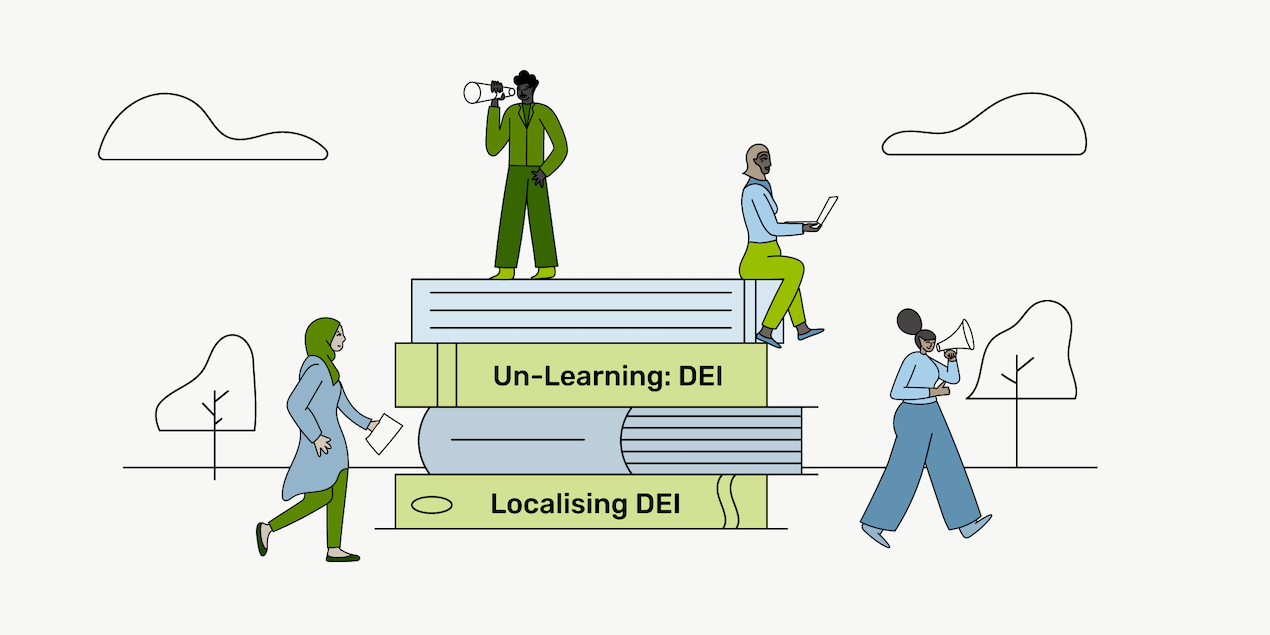Written by Mission Talent Team
Un-Learning DEI: Localisation

Diversity, equity, and inclusion (DEI) have become central pillars of organisational success in today’s interconnected world. Yet, despite widespread recognition of their importance, many struggle to implement DEI initiatives effectively on a global scale. The key to overcoming this challenge lies in understanding and embracing the concept of localisation in DEI efforts.
At the heart of the matter is a fundamental question:
What does diversity mean to your organisation, and what do you want to achieve by implementing a DEI policy?
Even though it sounds like an obvious question, we tend to jump right into drafting a DEI policy without answering this first. With the answer to this question, it is easier to approach DEI strategically. This concept is inherently complex and demands careful consideration of cultural, legal, and social contexts.
Embracing Cultural Relevance and Sensitivity
One of the cornerstones of localising DEI is recognising and respecting the diverse cultural landscapes in which organisations operate. What diversity looks like in one region may differ significantly from another. Organisations can ensure their DEI efforts are respectful and impactful by tailoring initiatives to address specific cultural nuances.
Navigating Legal and Social Frameworks
Legal requirements and societal norms vary widely across different countries, presenting unique challenges and opportunities for DEI initiatives. By conducting thorough needs assessments and aligning with local regulations, organisations can navigate these complexities and build comprehensive DEI policies that comply with local laws and promote social inclusion.
Enhancing Effectiveness and Innovation
Organisations can tap into a wealth of perspectives and experiences by fostering dialogue and coexistence among diverse groups, driving innovation and creativity. Region-specific resource groups and tailored training programmes can further encourage collaboration and celebrate diversity within the workplace.
Fostering Employee Engagement and Retention
Recognising and valuing employees’ unique backgrounds and experiences is essential for fostering a sense of belonging and loyalty. By adapting leadership training programmes and addressing conflicts through a lens of cultural competence, organisations can create inclusive work environments where employees feel respected and supported.
Addressing Conflict Resolution and Social Cohesion
By addressing specific local grievances and promoting conflict resolution as part of the organisational culture, they can contribute to peace-building efforts and strengthen social cohesion.
You can start localising DEI by:
- Engaging Local Stakeholders: Actively involve employees, management, and community leaders in the planning process.
- Conducting Localised Needs Assessments: Gather insights and data directly from local teams to understand specific challenges and opportunities.
- Customising DEI Policies and Programs: Tailor initiatives to align with regional nuances and cultural expectations.
- Leveraging Local DEI Champions: Empower individuals who can advocate for DEI within their regions and facilitate discussions.
- Ensure Clear Communication and Transparency: Communicate DEI policies clearly and make resources accessible to everyone.
- Monitor and Evaluate: Continuously assess the effectiveness of DEI efforts and iterate as needed.
Do not forget that while diversity initiatives should challenge individuals to grow and learn, they should not come at the expense of mental health. Thinking about the well-being of our team, organisations can ensure that their DEI efforts address important issues with positive outcomes in a sustainable manner.
Localising DEI is not just about adapting policies to fit different regions—it’s about embracing diversity in all its forms and creating inclusive environments where everyone feels valued and respected. By taking a localised approach, organisations can harness the power of diversity to drive innovation, foster engagement, and achieve global success.